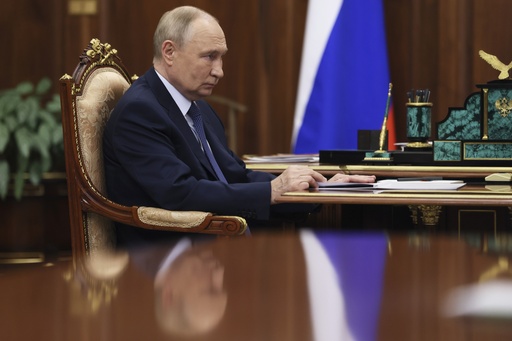WASHINGTON — Elon Musk, the influential billionaire behind SpaceX and a significant supporter of Donald Trump, has reportedly been in frequent communication with Russian President Vladimir Putin over the past two years, according to recent reports.
A source with knowledge of the situation, who requested anonymity due to the sensitive nature of the matter, has confirmed that Musk and Putin have engaged in calls, although details regarding the frequency, timing, and specifics of their conversations remain undisclosed.
Musk, recognized as the richest individual globally, also heads Tesla and the social media platform X. He has become a prominent voice within conservative circles in the United States, investing substantial amounts into Trump’s presidential campaign. Musk has transformed X into a hub favored by Trump supporters, conspiracy theorists, and those promoting Russian narratives.
The correspondence between Musk and Putin has sparked national security concerns, especially given Musk’s substantial contracts with the U.S. government, and has intensified worries about potential Russian influence on American political landscapes.
According to an article published recently, Musk and Putin have discussed a variety of topics, including personal, business, and geopolitical issues, as reported by multiple current and former officials from the U.S., Europe, and Russia.
In one conversation, Putin allegedly requested Musk not to activate his Starlink satellite network over Taiwan, framing it as a favor for Chinese President Xi Jinping, with whom he has formed a closer relationship. Since 2013, Putin and Xi have convened over 40 times.
While Russia has denied the existence of these dialogues, two years ago, Musk stated that he had only spoken to Putin once, focused solely on matters related to space. The Chinese Embassy in Washington commented that they were “unaware of the specifics” regarding any requests made by Putin on behalf of China.
Questions surrounding Musk’s discussions with Putin are heightening scrutiny over national security, particularly because SpaceX holds numerous lucrative government contracts, serving as a vital partner to NASA and other satellite initiatives.
Trump has indicated an intention to include Musk in his administration should he win the upcoming election. Experts assert that high-ranking executives at major defense contractors would likely confront similar scrutiny if they engaged in private talks with leaders like Putin.
Critics highlight that such undisclosed conversations could pose significant risks to Musk’s business dealings, indicating that well-managed discussions, sanctioned by corporate governance, would be more acceptable.
Furthermore, Putin’s request regarding Starlink is likely to attract attention due to the ongoing U.S. support for Taiwan and the rising partnership between Russia and China.
Musk has cultivated a beneficial rapport with Chinese leadership through Tesla’s Gigafactory in Shanghai and has consistently expressed favorable views toward China, aligning with its political narratives.
Meanwhile, Russian ties to U.S. adversaries continue to strengthen, with the U.S. alleging that Russia has supplied ballistic missiles to Iran, and North Korean troops have reportedly been sent to Russia, potentially to support operations in Ukraine.
Musk’s stance on the conflict in Ukraine has evolved; initially supportive of Ukraine and providing Starlink for communications, he later retracted permission for Ukraine to use the service for surprise attacks against Russian forces.
Musk had previously proposed a controversial plan to resolve the conflict, which entailed Ukraine relinquishing its aspirations for NATO membership and granting Russia permanent control over Crimea—an idea that drew sharp criticism from Ukrainian leaders.
One source familiar with Musk and Putin’s exchanges contended that there was no evidence to suggest that these contacts represented a substantial security threat to the U.S. The CIA, Pentagon, and National Security Council have refrained from commenting, and there has been no immediate feedback from the National Security Agency and State Department.
Musk’s affiliation with Trump is notable, as he made an appearance at a Trump rally while wearing a “Make America Great Again” hat and warned attendees that a Trump loss would signify “the last election.”
Last year, Musk mocked Ukrainian President Volodymyr Zelenskyy’s pleas for assistance and suggested that the U.S. should reduce aid, asserting that Ukraine could not secure a victory.
In light of these connections, concerns have arisen regarding Trump’s own interactions with Putin, with documentation indicating possible conversations between the two since Trump’s defeat in the 2020 election.
Responding to inquiries about Musk and Putin, a Trump campaign spokesperson lauded Musk as a unique industry leader capable of reforming the federal bureaucracy, and emphasized that Trump would work to restore a strong foreign policy approach toward Russia.
Kremlin spokesman Dmitry Peskov dismissed claims of frequent communications, declaring them to be false. He acknowledged a previous conversation between Musk and Putin prior to 2022 but categorized it as a brief, introductory discussion focused on technological advancements.
In response to reports regarding Musk and Putin’s communications, Ukraine’s military intelligence indicated that they would refrain from issuing comments.
Home World Live International Crisis An examination of Musk’s interactions with Putin and their significance.
